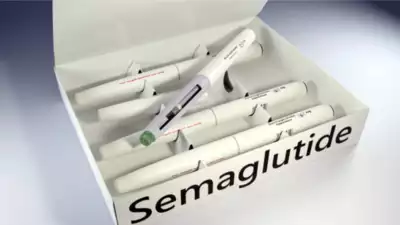- News
- lifestyle
- health-fitness
- health-news
- WHO issues warning on fake versions of drugs commonly used for diabetes and weight loss
Trending
WHO issues warning on fake versions of drugs commonly used for diabetes and weight loss
The WHO warns about counterfeit versions of popular drugs like Novo Nordisk's Ozempic and semaglutide, used for diabetes and weight loss. Falsified drugs can have harmful effects on health, including unmanaged blood glucose levels and unpredictable health risks from undeclared active ingredients. Surging demand for the drugs is driving the counterfeit marketing of these drugs.

Fake and counterfeit versions of popular drugs widely used for diabetes and weight loss could have harmful effects on human health, the World Health Organisation (WHO) said on Thursday and has released a warning on the falsified drugs and has urged individuals to check products properly before using.
The WHO press release has issued warning on fake copies of Novo Nordisk's drugs, Ozempic.The WHO's alert addresses three falsified batches of semaglutide that were detected in Brazil and the UK in October 2023, and the United States in December 2023.
Surging demand for the drugs is driving the counterfeit marketing of these drugs.
"WHO has been observing increased demand for these medicines as well as reports on falsification. These falsified products could have harmful effects to people’s health; if the products don’t have the necessary raw components, falsified medicines can lead to health complications resulting from unmanaged blood glucose levels or weight. In other cases, another undeclared active ingredient may be contained in the injection device, e.g. insulin, leading to an unpredictable range of health risks or complications," the UN agency has said in a press release.
What are semaglutides?
Semaglutides are a class of medications used primarily for the treatment of type 2 diabetes and obesity. They belong to a group of drugs known as GLP-1 (glucagon-like peptide-1) receptor agonists. These medications mimic the action of the natural hormone GLP-1, which is involved in the regulation of blood sugar levels and appetite.
Semaglutides work by stimulating insulin secretion from the pancreas in response to high blood sugar levels, thereby helping to lower blood glucose. They also slow gastric emptying, which helps to reduce post-meal blood sugar spikes and increase feelings of fullness, contributing to weight loss. This dual action makes semaglutides effective in both managing blood sugar levels in diabetic patients and promoting weight loss in individuals with obesity.
One of the popular forms of semaglutide is marketed under the brand names Ozempic and Rybelsus for diabetes treatment, and Wegovy for weight management. These medications are typically administered via injection (Ozempic and Wegovy) or oral tablet (Rybelsus).
Clinical studies have shown that semaglutides can significantly improve glycemic control, reduce body weight, and lower the risk of cardiovascular events in people with type 2 diabetes.
Are they reliable for diabetes management?
"Semaglutides are not part of WHO-recommended treatments for diabetes management due to their current high cost. The cost barrier makes these products unsuitable for a public health approach, which aims to ensure the widest possible access to medicines at the population level and to strike a balance between the best-established standard of care and what is feasible on a large scale in resource-limited settings. Also, there are more affordable treatments available for diabetes, with similar effects to those of semaglutides on blood sugar and cardiovascular risk," the WHO says.
https://timesofindia.indiatimes.com/life-style/health-fitness/health-news/warning-signs-of-diabetes-seen-only-during-the-morning-hours/photostory/110691322.cms
It has urged individuals to check packaging and expiry dates of medicines when they buy them, and use the products as prescribed. In the case of injectable semaglutides, patients should ensure they are stored in the refrigerator.
How to identify falsified products
The WHO press release has issued warning on fake copies of Novo Nordisk's drugs, Ozempic.The WHO's alert addresses three falsified batches of semaglutide that were detected in Brazil and the UK in October 2023, and the United States in December 2023.
Surging demand for the drugs is driving the counterfeit marketing of these drugs.
"WHO has been observing increased demand for these medicines as well as reports on falsification. These falsified products could have harmful effects to people’s health; if the products don’t have the necessary raw components, falsified medicines can lead to health complications resulting from unmanaged blood glucose levels or weight. In other cases, another undeclared active ingredient may be contained in the injection device, e.g. insulin, leading to an unpredictable range of health risks or complications," the UN agency has said in a press release.
What are semaglutides?
Semaglutides work by stimulating insulin secretion from the pancreas in response to high blood sugar levels, thereby helping to lower blood glucose. They also slow gastric emptying, which helps to reduce post-meal blood sugar spikes and increase feelings of fullness, contributing to weight loss. This dual action makes semaglutides effective in both managing blood sugar levels in diabetic patients and promoting weight loss in individuals with obesity.
One of the popular forms of semaglutide is marketed under the brand names Ozempic and Rybelsus for diabetes treatment, and Wegovy for weight management. These medications are typically administered via injection (Ozempic and Wegovy) or oral tablet (Rybelsus).
World Kidney Day: Kidney issues those with diabetes are prone to
Clinical studies have shown that semaglutides can significantly improve glycemic control, reduce body weight, and lower the risk of cardiovascular events in people with type 2 diabetes.
Are they reliable for diabetes management?
https://timesofindia.indiatimes.com/life-style/health-fitness/health-news/warning-signs-of-diabetes-seen-only-during-the-morning-hours/photostory/110691322.cms
It has urged individuals to check packaging and expiry dates of medicines when they buy them, and use the products as prescribed. In the case of injectable semaglutides, patients should ensure they are stored in the refrigerator.
How to identify falsified products
- Check the lot number and serial number: WHO advises not to distribute, use, or sell products labelled with batch numbers listed in Annex.
- Examine the pen: Falsified Ozempic pens may have a scale extending out from the pen when setting the dose.
- Assess the label quality: The label might be of poor quality and may not adhere well to the pen.
- Look for spelling mistakes: The carton may have spelling mistakes on the front of the box.
End of Article
FOLLOW US ON SOCIAL MEDIA









